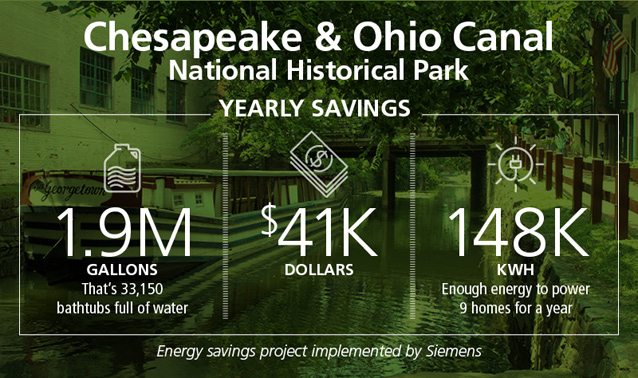The National Park Service is investing $29 million in 81 individual energy efficiency and water conservation projects at national parks throughout the greater Washington region.

NPS / Siemens
Reducing Energy Consumption
Reducing Energy Consumption
C&O Canal NHP’s most significant contributor to GHG emissions is purchased electricity. To reduce overall energy use and operating costs, the park:
- Upgraded to ENERGY STAR computers.
- Created a plan to reduce lawn mowing activities.
- Encouraged telework for park employees.
- Implemented a policy of turning off lights, computers, and monitors when not in use.
- Eliminated the use of air conditioning on specific floors and in certain buildings.
- Investigated and developed renewable energy sources where possible.
Energy Savings Performance Contract
As part of the larger National Capital Region (NCR) Energy Savings Performance Contract (ESPC) project, C&O Canal NHP:
- Installed programmable thermostats in park facilities.
- Replaced antiquated appliances with low-flow water fixtures and performed an ice machine retrofit.
- Upgraded to LED lighting with intelligent lighting controls.
- Identified areas that would benefit from solar tube technology.
The C&O Canal NHP expects to reduce their GHG emissions by 21 percent through the ESPC.
Reducing Transportation Emissions
Transportation is the second largest contributor of GHG emissions at C&O Canal NHP. To reduce transportation-related emissions, the park:
- Relocated Park Headquarters to a more accessible, central location.
- Leased flex fuel and hybrid vehicles when renewing leases and eliminated two SUVs from the park fleet.
- Right-sized vehicles and established the practice of using small utility vehicles for short trips.
- Held virtual employee meetings to reduce transportation emissions from park employees.
- Purchased battery-operated lawn equipment and weed eaters.
- Educated employees about flex fuels and biodiesel vehicles.
- Introduced a “no idling” policy for park-owned vehicles.
Increasing Climate Change Education Efforts
C&O Canal NHP hosts approximately 4 million visitors each year. The park’s climate education and outreach efforts are ongoing and extend beyond park employees to include visitors and the local community. These efforts include:
- Educating visitors and park employees on climate change impacts and how to reduce GHG emissions.
- Placing interpretive signs in restrooms that highlight energy efficient improvements.
- Encouraging bike commuting on the Towpath and Capital Crescent Trail.
- Installing warm season grasses to replace mowed turf where appropriate and developing education materials about the environmental benefits of the program.
- Using Facebook, Twitter, Instagram, and YouTube, and press releases to share environmental messages.
Last updated: September 22, 2016
